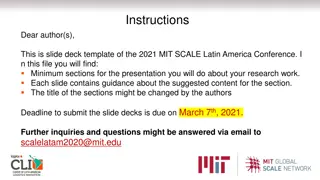
Chubby and Zookeeper: Implementing Replicated State Machines and Case Studies
Discover how Chubby and Zookeeper implement replicated state machines, logical clock-based ordering, fault-tolerant log, and highly available coordination services within Google. Case studies and examples provide insights into the functionality and design principles of these systems.
Download Presentation

Please find below an Image/Link to download the presentation.
The content on the website is provided AS IS for your information and personal use only. It may not be sold, licensed, or shared on other websites without obtaining consent from the author. If you encounter any issues during the download, it is possible that the publisher has removed the file from their server.
You are allowed to download the files provided on this website for personal or commercial use, subject to the condition that they are used lawfully. All files are the property of their respective owners.
The content on the website is provided AS IS for your information and personal use only. It may not be sold, licensed, or shared on other websites without obtaining consent from the author.
E N D
Presentation Transcript
LECTURE 10 Chubby and Zookeeper
Implementing RSMs 2 Logical clock based ordering of requests Cannot serve requests if any one replica is down Primary-backup replication Replace primary/backup upon failure Relies on always available view service Paxos-based replicated service Available as long as majority in same partition
Case Studies (in brief) 3 Chubby (OSDI 2006) ZooKeeper (USENIX ATC 2010)
Chubby 4 Internal service within Google Highly available coordination service
Chubby 5 Internal service within Google Highly available coordination service Two purposes: Lock service File system (for small files)
Example: GFS Chunkmaster 6 x = Open( /ls/gfs-cell8/chunkmaster") if (TryAcquire(x) == success) { // I'm the chunkmaster, tell everyone SetContents(x, my-address) } else { // I'm not the master, find out who is chunkmaster = GetContents(x) }
Why this interface? 7 Why not a library that implements Paxos? Developers do not know how to use Paxos They at least think they know how to use locks! Need to export result of coordination outside of system Example: Clients need to discover GFS master
Chubby Design 8 Replicated service using Paxos to implement fault-tolerant log
Chubby procedure Client sends request to nearest replica. Replica returns Chunkmaster s address Client directs requests to the Chunkmaster until it says it is no longer playing that role. Writes propagated to replicas using consensus Reads handled without consensus (Safe)
Chubby in Action 10 Modify file foo ? Read file foo
Reads in Paxos-based RSM 11 For every key, every replica stores (value, version) Return latest version out of majority of replicas V1 Read file foo V2 V1 V3 Read file foo V2 Why do different replicas have different versions? Gap between Accept and Learn
Reads in Paxos-based RSM 12 How to ensure linearizability? A read must see the effect of all accepted writes Get read accepted to one of the slots in replicated log Every replica executes command in a slot only after executing commands in all prior slots
RSM with Paxos 13 Slots in log
Reads in Paxos-based RSM 14 How to ensure linearizability? A read sees the effect of all accepted writes Get read accepted to one of the slots in replicated log Problem: Poor performance at scale
Reads/Writes in Chubby 15 One of the 5 replicas chosen as the master Clients submit all reads and writes to master How to handle master failure? Another replica must propose itself as master New master must first catch up Master is performance bottleneck
Client sessions A client requests a new session by contacting the master of a Chubby cell It ends the session when it terminates or if it has been idle (no open handles or no calls for a minute). Lease session needs to be renewed before lease expires. Master can move it forward but not backward.
Event subscriptions Clients may subscribe to a range of events (e.g., file contents modified or master failure). Such events are delivered asynchronously via an up-call from the Chubby library. Delivered after the event has taken place
Scaling Chubby 18 Clients cache data they read Reading from local cache violates linearizability How to fix this? Master invalidates cached copies upon update Modification blocked until invalidations are sent Note that caches not updated (only invalidated) this may be unnecessary. Reads proceed as usual (much more frequent than writes) Master must store knowledge of client caches What if master fails?
Grace period for leases Grace period after lease expires If keepalive received within grace period, state updated If grace period expires, the client assumes session has expired (Chubby cell inaccessible) Call returns with an error Failed master discards state about sessions, handles and locks.
Scaling Chubby with Proxies 20 Proxy Proxy Chubby
Handling client failures 21 What if a client acquires a lock and fails? Client library exchanges keep-alives with master Lock revoked upon client failure Problem? Network partition not client failure Chubby associates lock acquisitions with sequence numbers Can distinguish operations from previous lock holders
Discrepancy in Lock Validity 22 Lock service Replica 1 Client2 Client1 Replica 2 Replica 3 Check with lock service to confirm lock validity
ZooKeeper 23 Open source coordination service Addresses need for polling in Chubby Example: If you cannot acquire lock, need to retry Goal in ZooKeeper: Wait-free coordination
ZooKeeper: Watch mechanism 24 Clients can register to watch a file Watches are one-time triggers associated with a session (unregistered once triggered or when session closes) ZooKeeper notifies client when file is updated (trigger) Example: Try to acquire a lock by creating a file with an ephemeral flag If file already exists, watch for updates Upon watch notification, try to re-acquire lock Problem? Herd effect Many clients which get notification may vie for the lock
ZooKeeper: Sequencer 26 lock-1 lock-2 lock-3
Zookeper:Sequencer The SEQUENTIAL flag orders the client s attempt to acquire lock with respect to others. If the znode created is lowest, get lock; else, wait for deletion of immediately prior znode. Herd effect avoided by waking up only one process when lock is released or a lock request is abandoned. Releasing lock: delete the proper znode.
Chubby vs. ZooKeeper 28 Difference between invalidation and watch? Invalidation: Only library receives notification to update cache Watch: Application receives notification Only app knows what it needs to do




















